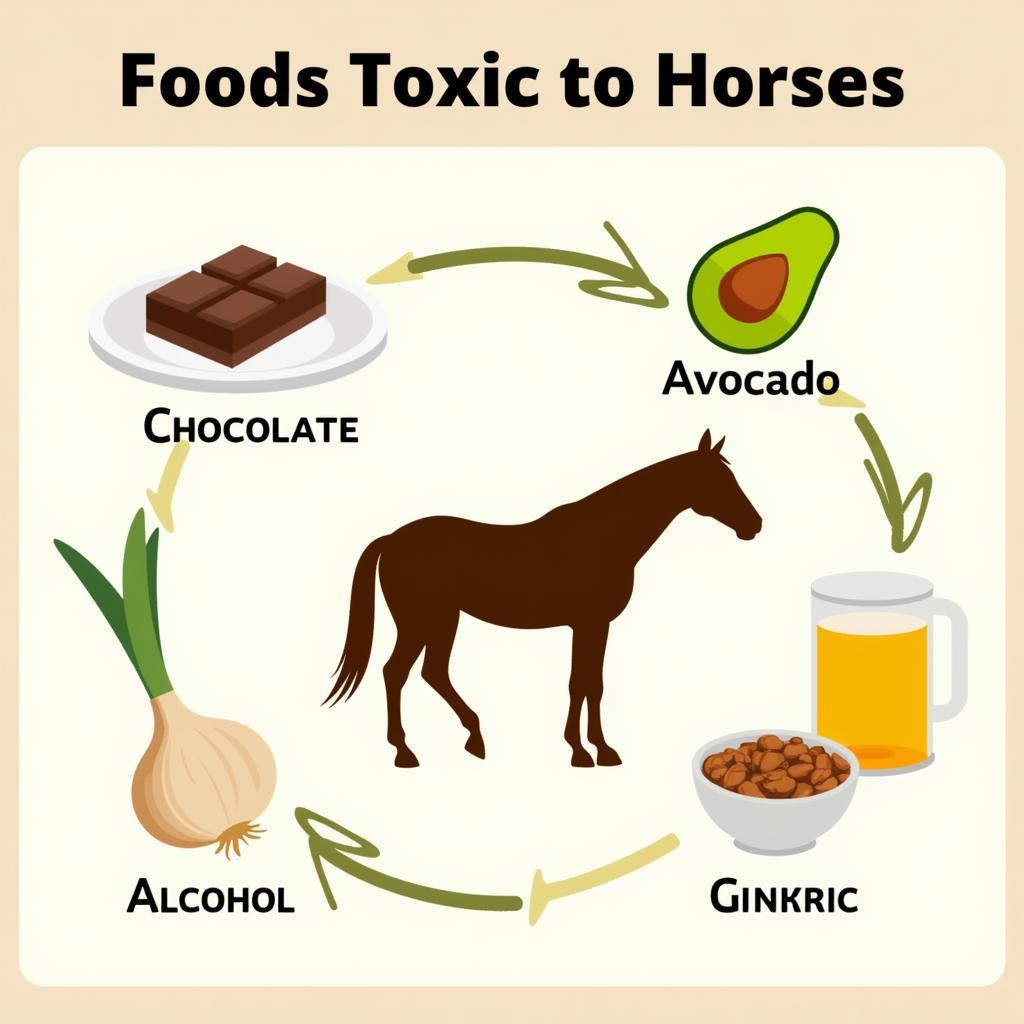Horses are beautiful, majestic creatures that require a specific diet to thrive. While we often focus on what to feed horses, it’s equally important to understand What Can Horses Not Eat. Many common foods and plants can be toxic to horses, causing a range of health issues from mild digestive upset to severe illness and even death. This comprehensive guide explores the foods and substances that are poisonous to horses, empowering you with the knowledge to keep your equine companions safe and healthy.
Common Foods That Are Toxic to Horses
Let’s start by exploring some surprisingly common human foods that can be dangerous for your horse:
- Chocolate: Like dogs, horses cannot metabolize theobromine found in chocolate. Even small amounts can cause colic, tremors, and heart problems.
- Avocado: This seemingly harmless fruit contains persin, a toxin that can trigger colic, respiratory distress, and even heart failure in horses.
- Caffeine: Found in coffee, tea, and some sodas, caffeine acts as a stimulant and can cause nervousness, increased heart rate, and digestive issues in horses.
- Alcohol: Never give alcohol to horses. It can lead to severe intoxication, liver damage, and even death.
- Onions and Garlic: These members of the allium family can damage red blood cells in horses, leading to a condition called Heinz body anemia.
 Forbidden Foods for Horses
Forbidden Foods for Horses
Garden Variety Dangers: Plants Toxic to Horses
Your backyard might hold hidden dangers for your horses. Many common garden plants are toxic to equines:
- Yew: All parts of the yew plant, including the berries, are highly poisonous to horses, causing sudden death in severe cases.
- Oleander: This popular ornamental shrub contains cardiac glycosides, which are toxic to the heart and can be fatal to horses.
- Rhododendrons and Azaleas: These plants contain grayanotoxins, which interfere with the nervous system and can cause weakness, paralysis, and even death.
- Foxglove: All parts of the foxglove plant contain cardiac glycosides, making them extremely dangerous to horses.
- Bracken Fern: This common fern can cause vitamin B1 deficiency in horses, leading to neurological problems.
It’s crucial to fence off your garden and ensure your horse cannot access these plants.
The Importance of Safe Hay and Pasture Management
Providing your horse with safe and high-quality forage is essential. Here are some things to keep in mind:
- Alfalfa: While alfalfa is a nutritious hay for many horses, it’s not suitable for all. Horses prone to laminitis or with certain metabolic conditions should avoid alfalfa.
- Moldy Hay: Moldy hay can harbor harmful fungi that produce mycotoxins, leading to respiratory problems, colic, and other health issues.
- Pasture Management: Regularly inspect your pastures for toxic plants and remove them immediately. Rotate pastures to prevent overgrazing and reduce the risk of parasite infestation.
Recognizing the Signs of Poisoning in Horses
Early detection of poisoning is crucial for successful treatment. Be vigilant for these signs:
- Loss of appetite
- Colic (abdominal pain)
- Diarrhea
- Lethargy
- Tremors
- Difficulty breathing
- Seizures
If you suspect your horse has ingested something toxic, contact your veterinarian immediately.
Preventing Horse Poisoning: Proactive Steps for Equine Safety
The best way to deal with horse poisoning is to prevent it altogether. Implement these safety measures:
- Secure Storage: Store all feed, supplements, and potentially toxic substances in secure containers out of reach of your horses.
- Fence Lines: Check fence lines regularly for gaps or damage and repair them promptly. Ensure fences are tall enough and sturdy enough to prevent horses from reaching over or through.
- Pasture Maintenance: As mentioned earlier, routinely inspect and clear pastures of toxic plants.
- Educate Yourself: Familiarize yourself with common toxic plants in your area and learn to identify them.
FAQs About What Horses Can’t Eat
Can horses eat apples?
Yes, horses can eat apples in moderation. However, remove the seeds and core as they contain cyanide, which can be toxic in large amounts.
Are acorns poisonous to horses?
Yes, acorns are toxic to horses. They contain tannins that can cause colic, kidney damage, and even death.
Can horses eat bread?
While small amounts of plain bread are unlikely to cause serious harm, it’s best to avoid feeding bread to horses. Bread can expand in their stomachs, potentially leading to colic.
Are tomatoes bad for horses?
Tomato vines and leaves contain solanine, which is toxic to horses. While ripe tomatoes are generally considered safe in small amounts, it’s best to err on the side of caution and avoid feeding them.
Can horses eat grass clippings?
It’s not recommended to feed grass clippings to horses. They can ferment rapidly in the gut, causing colic and other digestive issues.
Protecting Your Equine Companion: Knowledge is Key
Understanding what can horses not eat is a fundamental aspect of responsible horse ownership. By being aware of potential hazards and taking proactive steps to prevent poisoning, you can ensure the well-being of your equine companions. Remember, when it comes to your horse’s health, knowledge is power.
If you have any concerns about your horse’s diet or suspect they may have ingested something toxic, consult with your veterinarian immediately.
For further information on equine health and well-being, browse our extensive resources on JustusHorsesUSA.com.
Need Help? Contact us!
Phone Number: 0772127271
Email: [email protected]
Address: QGM2+WX2, Vị Trung, Vị Thuỷ, Hậu Giang, Việt Nam
Our customer support team is available 24/7 to assist you.